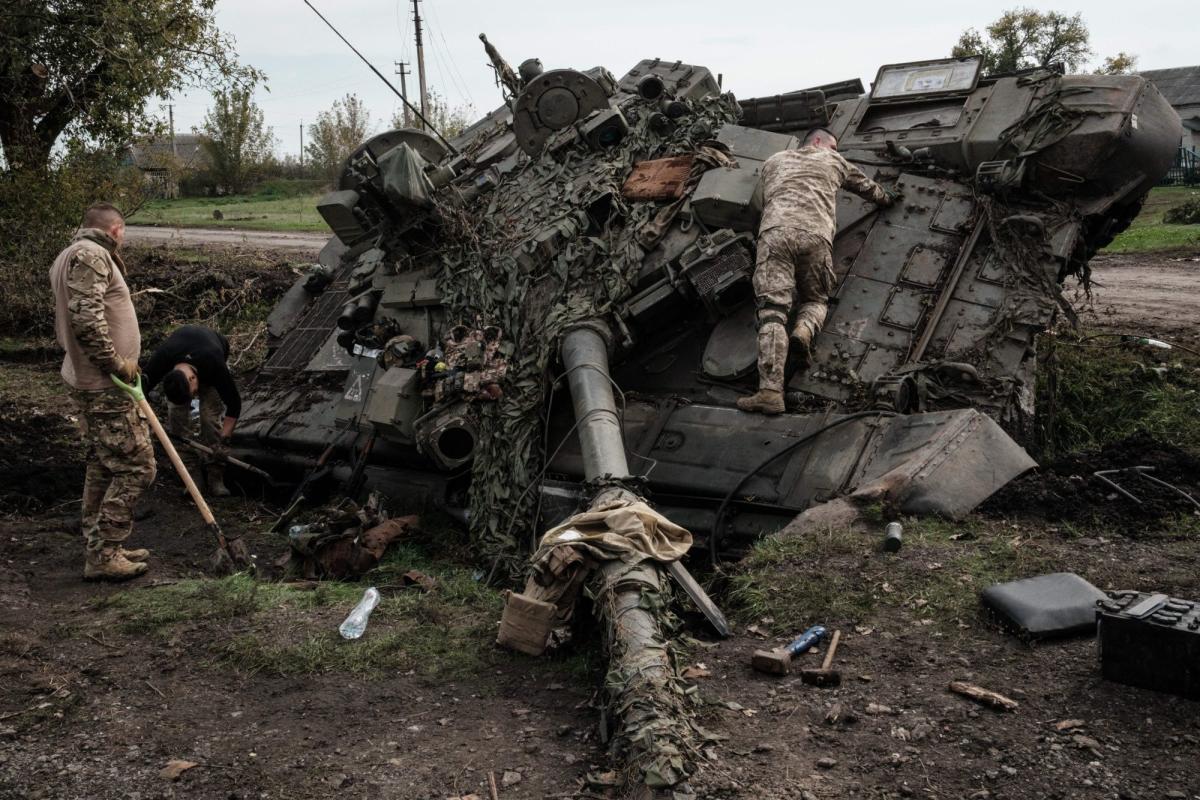
(Bloomberg) — President Vladimir Putin’s defense minister said the army had grown by 200,000 more troops since the Kremlin declared a partial mobilization last month, although Russia’s neighbors cited figures showing far more Russians had fled abroad.
Most Read from Bloomberg
Ukraine’s army has liberated more than 450 settlements in the northern Kharkiv region alone since September, President Volodymyr Zelenskiy said in his nightly address. European Union countries edged closer to a deal on a new sanctions package against Russia.
Zelenskiy also joined an outpouring of scorn against Tesla co-founder Elon Musk for suggesting on Twitter that Ukraine seek a negotiated solution to the war and cede Crimea to Russia for good. The Kremlin called Musk’s comments “quite positive.”
(See RSAN on the Bloomberg Terminal for the Russian Sanctions Dashboard.)
Key Developments
-
More Russians Flee Than Join Putin’s Army After Call-Up for War
-
NATO Puzzles Over How to Shield Vital Undersea Links From Attack
-
Ukraine Advances in South After Hammering Russians in Northeast
-
Musk Sets Off Uproar in Ukraine by Tweeting His ‘Peace’ Plan
-
EU Moves Closer to Russia Sanctions Deal With Oil Price Cap
-
In Putin’s Nuclear Brinksmanship, Weapons Leave Room For Warning
On the Ground
Ukrainian forces made substantial gains around Lyman and in the northern Kherson region over the last 24 hours, the US-based Institute for the Study of War said. The Russian units defeated on these fronts were previously considered to be among Russia’s top conventional fighting forces. Ukrainian forces made advances on the Oskil River-Kreminna line toward the Luhansk region border. Russia launched a missile attack on the city of Kharkiv overnight, with one woman dying, the regional governor Oleh Synyehubov said on Telegram. More than 20 Ukrainian settlements have been shelled by Russia over the past day, Ukraine’s General Staff reported.
(All times CET)
More Russians Flee Than Join Putin’s Army (2:11 p.m.)
Far more Russians have fled abroad than have enlisted in the military since Putin announced a mobilization to bolster his faltering invasion of Ukraine.
Defense Minister Sergei Shoigu said more than 200,000 people have been conscripted into the army since Putin’s Sept. 21 order for a partial call-up, Russian news services reported Tuesday.
That matches an exodus of more than 200,000 Russians to neighboring Kazakhstan alone, according to the central Asian country’s interior minister. Georgian authorities said almost 69,000 Russians had arrived from across the border by Sept. 30, while almost the same amount crossed into the EU.
NATO Puzzles Over How to Protect Undersea Links (2:21 p.m.)
NATO allies are struggling to work out how to better shield undersea critical infrastructure after the Nord Stream pipeline blasts laid bare the difficulty of monitoring facilities and identifying attackers.
Danish, Swedish and German officials are still investigating the causes, a process that can take weeks, while allies of NATO have rushed to deploy military vessels and planes to monitor the Baltic and North Seas.
The sheer scale and underwater depth of assets such as pipelines — or data cables that allow the internet to function — heighten the challenge for governments.
Putin Opponent Navalny’s Backers Restart Russia Movement (2:05 p.m.)
Top aides to jailed Russian opposition leader Alexey Navalny said they’re restarting a national protest movement to capitalize on growing discontent over the war in Ukraine.
“The sleeping majority woke up,” said Ivan Zhdanov, a Navalny lieutenant, in a video posted on YouTube. “Putin woke it up himself.”
The Russian president’s decision last month to call up several hundred thousand reservists after setbacks in Ukraine alarmed the Russian population, according to opinion polls. The government banned Navalny’s organizations last year as “extremist.” The new network will be underground.
Western Officials See No Change In Moscow’s Nuclear Stance (12:55 p.m.)
Western officials said they don’t believe Russia has changed its nuclear posture despite unconfirmed newspaper reports on moves by Moscow. London’s Times reported that a train linked to Russia’s main nuclear command was seen on the move, while Italy’s La Repubblica reported a planned test of a new nuclear torpedo dubbed the ‘apocalypse weapon.’
The officials, who declined to be named on a confidential issue, said they had not seen any indicators or activities that were out of the norm conducted by Russian strategic nuclear forces.
Kremlin Says Musk’s Interest in Peace ‘Quite Positive’ (12:15 p.m.)
The Kremlin called Elon Musk’s desire for a peaceful solution in Ukraine “quite positive.”
“Many of the ideas in Musk’s tweets deserve attention,” spokesman Dmitry Peskov said on a conference call. But Peskov was cool to Musk’s proposal for new annexation votes in Russian-occupied lands, saying Russia’s absorption of the territories is not open to discussion. “Reaching peace is completely impossible without fulfilling Russia’s terms,” Peskov said.
Belarus’s Lukashenko Acknowledges Backing Russia’s War (11:50 a.m.)
Belarus President Alexander Lukashenko publicly acknowledged his country is taking part in Russia’s so-called “special military operation” in Ukraine, his first such statement since the start of Moscow’s war against Ukraine.
Lukashenko said his country’s participation is limited to preventing the conflict from spreading to Belarus, protecting Russian troops deployed in his country from attacks, and giving them medical care. “We are not killing anyone”, state-owned news agency Belta cited Lukashenko as saying. Lukashenko provided his country’s territory to Russia for the invasion.
Russian Missile Attack Triggers Rail Blackout in Kharkiv (11:35 a.m.)
Russian forces shelled Kharkiv, Ukraine’s second-largest city, with missiles overnight, disrupting the railway network’s power supply, Ukrainian Infrastructure Minister Oleksandr Kubrakov said on Facebook. “The enemy is attacking civilian infrastructure, trying to take revenge for defeats and intimidate Kharkiv residents,” Kubrakov said.
Railway workers sought to keep traffic delays minimal, Kubrakov added. Railway connections have already been restored to more than 45 settlements in the region, in particular to the recently-won cities of Balaklia, Derhachi and Chuhuiv. Work was underway to restore connections with Izyum and Kupiansk.
Zelenskiy Signs Decree to Rule Out Talks With Putin (10:55 a.m.)
President Zelenskiy signed a decree which effectively bans any negotiations with Russian President Vladimir Putin, according to a document text on the Ukrainian leader’s official website. The decree enacts a decision by the country’s National Security and Defense Council stipulating the “impossibility of conducting negotiations” with Putin.
The same decision also approves the country’s government appeal to join the NATO military alliance. “We are ready for a dialog with Russia, but with another president of Russia,” Zelenskiy said Oct. 30 as he presented the country’s application for a fast-track entry to NATO.
Zelenskiy Says Ukraine’s Counter-Offensive Continues (8:10 a.m.)
The Ukrainian army has retaken settlements in several regions, Zelenskiy said in his nightly address. “Fierce fighting continues in many areas of the front,” he said.
Zelenskiy said that among the Russian troops killed were those drafted a week or two ago. “And when these new ones die, more people will be sent. This is how Russia fights. That’s how it will lose as well,” he said. “No sham referenda, announcements about annexations, conversations about the borders they invented and drew somewhere, will help them.”
Musk Says SpaceX Has Spent About $80 Million on Ukraine (6:25 a.m.)
SpaceX’s out-of-pocket costs for providing Ukraine with Starlink dishes stands at around $80 million so far, Elon Musk said in a tweet late Monday, adding that the company is “obviously” pro-Ukraine as it defends itself against the Russian invasion.
Musk, the company’s chief executive, infuriated Ukrainians when he suggested that the country seek a negotiated solution to the invasion by Russia and cede Crimea for good.
Most Read from Bloomberg Businessweek
©2022 Bloomberg L.P.




